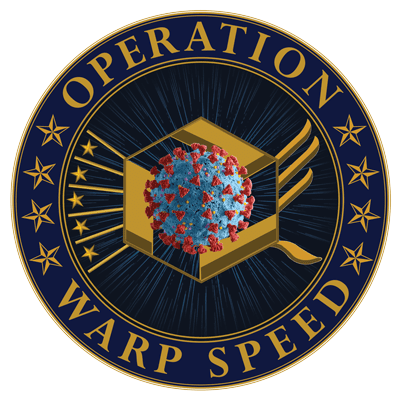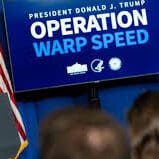Search Posts
Recent Posts
- Rhode Island Weather for June 5, 2025 – Jack Donnelly June 5, 2025
- RI Veterans: Did you know? 05.06.25 (Rental help, events, resources) – John A. Cianci June 5, 2025
- We Cook! Mill’s Tavern Rosemary-Lemon Statler Chicken, Yukon Golds, Haricot Vert and Dijon Demi June 5, 2025
- ICE arrests nearly 1,500 in Massachusetts. First part of “Operation Patriot” – Nantucket Current June 5, 2025
- Rhode Island Weather for June 4, 2025 – Jack Donnelly June 4, 2025
Categories
Subscribe!
Thanks for subscribing! Please check your email for further instructions.

Operation Warp Speed’s research partners – rushing to save our lives
Pfizer says they ARE part of Operation Warp Speed
Just about everything can become political. Even scientific developments. And when it comes to COVID-19, especially so.
Learning that Pfizer had developed the first vaccine, estimated to be about 90% effective, was a gleeful moment. From the stock market to other researchers to individuals to the federal government, it seemed time to break out the champagne.
Vice President Pence tweeted out his appreciation for Pfizer, saying that it was a great success, and part of Operation Warp Speed. Soon, however, Pfizer seemed to distance itself from OWS and noted that it had not received research money from the federal government.
But OWS is about more than money – it’s about communication and coordination and all the things that will accomplish its goal of producing millions of doses for the American people.
How did such a good news story start to get picked apart at a time of heightened political angst? One thing is that Pfizer CEO Albert Bourla does not like President Trump. And he was said to want to distance himself from any credit-sharing with the current administration.
After several media outlets, including Newsweek and CNN pursued the facts, Pfizer released this statement, by spokesperson Sharon Castillo saying that the company is indeed part of Operation Warp Speed:
“Pfizer is one of various vaccine manufacturers participating in Operation Warp Speed as a supplier of a potential COVID-19 vaccine,” Castillo said in an email. “While Pfizer did reach an advanced purchase agreement with the U.S. government, the company did not accept (Biomedical Advanced Research and Development Authority) funding for the research and development process. All the investment for R&D was made by Pfizer at risk. Dr. Jansen was emphasizing that last point.”
Newsweek looked into the issue that Pfizer was not part of OWS. In their story, they noted that Health and Human Services Secretary Alex Azar has said the pharmaceutical company Pfizer is “very much part” of Operation Warp Speed after the COVID-19 vaccine maker distanced itself from the Trump administration program.
Azar made the comments on CNBC’s Squawk Box on Tuesday, after Kathrin Jansen, the head of vaccine research and development at Pfizer, told The New York Times it was “never part” of Operation Warp Speed. Launched in May, the effort aims to speed up the creation and distribution of vaccines, treatments and diagnostic tools amid the COVID-19 pandemic.
The Health Secretary told CNBC: “I don’t know why they [Pfizer] made that [statement] originally. I’ve got a 2 billion contract for 100 million doses and an option for 500 million more that says they’re very much part of Operation Warp Speed.” The U.S. struck the $1.95 billion deal with Pfizer in July.
“We assisted them with ingredients, we’re assisting them with distribution syringes, needles, dry ice for shipment, distribution, planning,” he said.
Following Jansen’s comments, the company released their statement clarifying that it is involved in Operation Warp Speed as a supplier but wanted to liberate their scientists from any government bureaucracy, so they decided not to take government funding.

What did Pfizer CEO Burla do on the day the vaccine was announced?
Pfizer CEO Albert Bourla sold 62% of his stock in the company on the same day the drugmaker announced the results of its COVID-19 vaccine trial. He sold at the top 52 week high for Pfizer stock, for $5.6 million. Pfizer confirmed that Bourla’s stock sales were part of a plan that allows major shareholders and insiders of exchange-listed corporations to trade a predetermined number of shares at an agreed time. He still maintains stock in the company. There are 27 biomed companies whose Execs have cashed out more than $1 billion in profit.

What is Operation Warp Speed?
Operation Warp Speed’s goal is to produce and deliver 300 million doses of safe and effective vaccines with the initial doses available by January 2021, as part of a broader strategy to accelerate the development, manufacturing, and distribution of COVID-19 vaccines, therapeutics, and diagnostics (collectively known as countermeasures). OWS will allow countermeasures such as a vaccine to be delivered to patients more rapidly while adhering to standards for safety and efficacy.
Who’s working on Operation Warp Speed?
OWS is a partnership among components of the Department of Health and Human Services (HHS), including the Centers for Disease Control and Prevention (CDC), the National Institutes of Health (NIH), and the Biomedical Advanced Research and Development Authority (BARDA), and the Department of Defense (DoD).
OWS engages with private firms and other federal agencies, including the Department of Agriculture, the Department of Energy, and the Department of Veterans Affairs. It will coordinate existing HHS-wide efforts, including the NIH’s Accelerating COVID-19 Therapeutic Interventions and Vaccines (ACTIV) partnership, NIH’s Rapid Acceleration of Diagnostics (RADx) initiative, and work by BARDA.
What have they been doing?
OWS has been selecting the most promising countermeasure candidates and providing coordinated government support. Protocols for the demonstration of safety and efficacy are being aligned, which will allow these harmonized clinical trials to proceed more quickly, and the protocols for the trials will be overseen by the federal government (NIH), as opposed to traditional public-private partnerships, in which pharmaceutical companies decide on their own protocols. Rather than eliminating steps from traditional development timelines, steps will proceed simultaneously, such as starting manufacturing of vaccines and therapeutics at industrial scale well before the demonstration of efficacy and safety as happens normally. This increases the financial risk, but not the product risk.
U.S. Government Engages Pfizer to Produce Millions of Doses of COVID-19 Vaccine
The U.S. Department of Health and Human Services and the Department of Defense (DoD) today announced an agreement with U.S.-based Pfizer Inc. for large-scale production and nationwide delivery of 100 million doses of a COVID-19 vaccine in the United States following the vaccine’s successful manufacture and approval. The agreement also allows the U.S. government to acquire an additional 500 million doses.
The federal government will own the 100 million doses of vaccine initially produced as a result of this agreement, and Pfizer will deliver the doses in the United States if the product receives Emergency Use Authorization (EUA) or licensure from the U.S. Food and Drug Administration (FDA), as outlined in FDA guidance, after completing demonstration of safety and efficacy in a large Phase 3 clinical trial.
By entering into this agreement now, a safe and effective vaccine can be shipped quickly if FDA grants EUA or licensure. This approach helps meet the U.S. government’s Operation Warp Speed goal to begin delivering 300 million of doses of safe and effective vaccine to the American people by the end of the year.
“Through Operation Warp Speed, we are assembling a portfolio of vaccines to increase the odds that the American people will have at least one safe, effective vaccine as soon as the end of this year,” said HHS Secretary Alex Azar. “Depending on success in clinical trials, today’s agreement will enable the delivery of approximately 100 million doses of vaccine being developed by Pfizer and BioNTech.”
The Biomedical Advanced Research and Development Authority (BARDA), part of the HHS Office of the Assistant Secretary for Preparedness and Response, collaborated with the DoD Joint Program Executive Office for Chemical, Biological, Radiological and Nuclear Defense and Army Contracting Command, to provide $1.95 billion for the production and nationwide delivery of the first 100 million doses of the vaccine after EUA or licensure, with the ability to acquire up to an additional 500 million doses.
Subject to technical success and EUA or licensure, the company would begin nationwide delivery of these vaccine doses to locations at the U.S. government’s direction beginning in the fourth quarter of 2020. The vaccine would be available to the American people at no cost. As is customary with government-purchased vaccines, healthcare professionals could charge insurers for the cost of administering the vaccine.
Pfizer is collaborating with BioNTech, a German biotechnology company, to develop COVID-19 investigational vaccines without U.S. government financial support. Phase 1/2 clinical trials are underway for the investigational vaccines in the United States and Germany.
What other companies does OWS Support for Research and Vaccine Development?
March 30: HHS announced $456 million in funds for Johnson & Johnson’s (Janssen) candidate vaccine. Phase 1 clinical trials began in Belgium on July 24th and in the U.S on July 27th. Janssen’s large-scale Phase 3 clinical trial began on September 22, 2020, making them the fourth OWS candidate to enter Phase 3 clinical trials in the United States. Up to 60,000 volunteers will be enrolled in the trial at up to nearly 215 clinical research sites in the United States and internationally.
April 16: HHS made up to $483 million in support available for Moderna’s candidate vaccine, which began Phase 1 trials on March 16 and received a fast-track designation from FDA. This agreement was expanded on July 26 to include an additional $472 million to support late-stage clinical development, including the expanded Phase 3 study of the company’s mRNA vaccine, which began on July 27th.
May 21: HHS announced up to $1.2 billion in support for AstraZeneca’s candidate vaccine, developed in conjunction with the University of Oxford. The agreement is to make available at least 300 million doses of the vaccine for the United States, with the first doses delivered as early as October 2020, if the product successfully receives FDA EUA or licensure. AstraZeneca’s large-scale Phase 3 clinical trial began on August 31, 2020.
July 7: HHS announced $450 million in funds to support the large-scale manufacturing of Regeneron’s COVID-19 investigational anti-viral antibody treatment, REGN-COV2. This agreement is the first of a number of OWS awards to support potential therapeutics all the way through to manufacturing. As part of the manufacturing demonstration project, doses of the medicine will be packaged and ready to ship immediately if clinical trials are successful and FDA grants EUA or licensure.
July 7: HHS announced $1.6 billion in funds to support the large-scale manufacturing of Novavax’s vaccine candidate. By funding Novavax’s manufacturing effort, the federal government will own the 100 million doses expected to result from the demonstration project
July 22: HHS announced up to $1.95 billion in funds to Pfizer for the large-scale manufacturing and nationwide distribution of 100 million doses of their vaccine candidate. The federal government will own the 100 million doses of vaccine initially produced as a result of this agreement, and Pfizer will deliver the doses in the United States if the product successfully receives FDA EUA or licensure, as outlined in FDA guidance, after completing demonstration of safety and efficacy in a large Phase 3 clinical trial, which began July 27th
July 31: HHS announced approximately $2 billion in funds to support the advanced development, including clinical trials and large-scale manufacturing, of Sanofi and GlaxoSmithKline’s (GSK) investigational adjuvanted vaccine. By funding the manufacturing effort, the federal government will own the approximately 100 million doses expected to result from the demonstration project. The adjuvanted vaccine doses could be used in clinical trials or, if the FDA authorizes use, as outlined in agency guidance, the doses would be distributed as part of a COVID-19 vaccination campaign.•
August 5: HHS announced approximately $1 billion in funds to support the large-scale manufacturing and delivery of Johnson & Johnson’s (Janssen) investigational vaccine candidate. Under the terms of the agreement, the U.S. Government will own the resulting 100 million doses of vaccine, and will have the option to acquire more. The company’s investigational vaccine relies on Janssen’s recombinant adenovirus technology, AdVac, a technology used to develop and manufacture Janssen’s Ebola vaccine with BARDA support; that vaccine received European Commission approval and was used in the Democratic Republic of the Congo (DRC) and Rwanda during the 2018-2020 Ebola outbreak that began in the DRC.•
August 11: HHS announced up to $1.5 billion in funds to support the large-scale manufacturing and delivery of Moderna’s investigational vaccine candidate. Under the terms of the agreement, the U.S. Government will own the resulting 100 million doses of vaccine and will have the option to acquire more. The vaccine, called mRNA-1273, has been co-developed by Moderna and scientists from the National Institute of Allergy and Infectious Diseases (NIAID), part of the National Institutes of Health. NIAID has continued to support the vaccine’s development including nonclinical studies and clinical trials. Additionally, BARDA has supported phase 2/3 clinical trials, vaccine manufacturing scale up and other development activities for this vaccine. The Phase 3 clinical trial, which began
August 23: As part of the agency’s efforts to combat COVID-19, the FDA issued an emergency use authorization (EUA) for investigational convalescent plasma. Based on available scientific evidence, the FDA determined convalescent plasma may be effective in lessening the severity or shortening the length of COVID-19 illness in hospitalized patients, and that the known and potential benefits of the product outweigh the known and potential risks. The EUA authorizes the distribution of convalescent plasma in the U.S. as well as its administration by health care providers, as appropriate, to treat suspected or confirmed cases of COVID-19. Click here to learn more about EUAs.•
October 9: HHS announced an agreement with AstraZeneca for late-stage development and large-scale manufacturing of the company’s COVID-19 investigational product AZD7442, a cocktail of two monoclonal antibodies, that may help treat or prevent COVID-19. The goal of AstraZeneca’s partnership with the U.S. Government is to develop a monoclonal antibody cocktail that can help prevent infection. An effective monoclonal antibody that can prevent COVID-19, particularly one that is long-lasting and delivered by intramuscular injection, may be of particular use in certain groups. This includes people who have compromised immune function, those who are over 80 years old, and people undergoing medical treatments that preclude them from receiving a COVID-19 vaccine.•
October 28: HHS announced a $375 million agreement with Eli Lilly and Company to purchase the first doses of the company’s COVID-19 investigational antibody therapeutic bamlanivimab, also known as LY-CoV555. Bamlanivimab currently is being evaluated in Phase 3 clinical trials funded by Eli Lilly, in addition to clinical trials as part of the ACTIVpublic-private partnership. The FDA is reviewing bamlanivimab as a possible treatment for COVID-19 in outpatients. Monoclonal antibodies, which mimic the human immune system, bind to certain proteins of a virus, reducing the ability of the virus to infect hum
Making these products affordable for Americans
The Administration is committed to providing free or low-cost COVID-19 countermeasures to the American people as fast as possible. Any vaccine or therapeutic doses purchased with US taxpayer dollars will be given to the American people at no cost.
After the announcement of the vaccine by Pfizer, Eli Lilly announced their therapeutic, and Moderna is expected to announce in the next day or so their own vaccine progress.

.

Great news and truly an amazing feet from our Government and the pharmacy’s-
And it is too bad people like-Pfizer CEO Albert Bourla does not like President Trump. And he was said to want to distance himself from any credit-sharing with the current administration.
Why make life and death a political issue ? Disgusting!